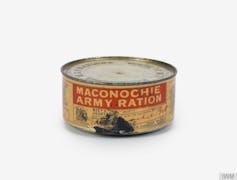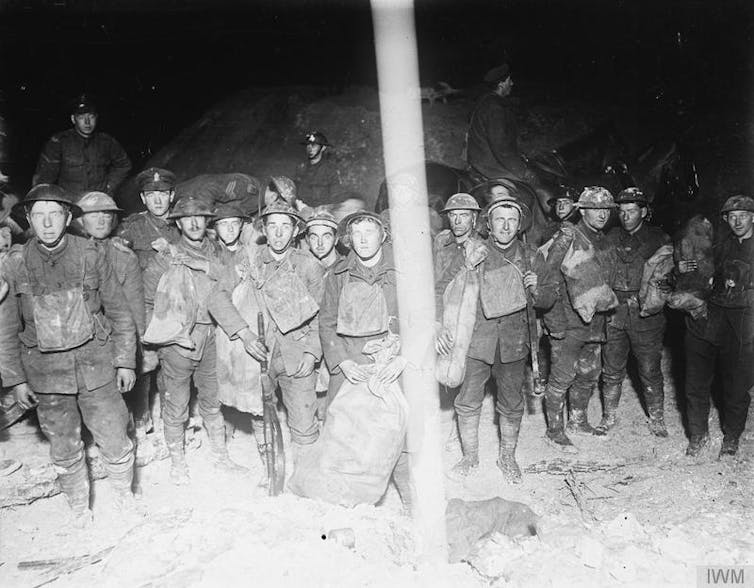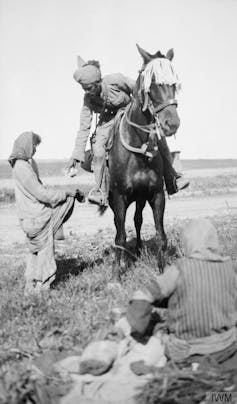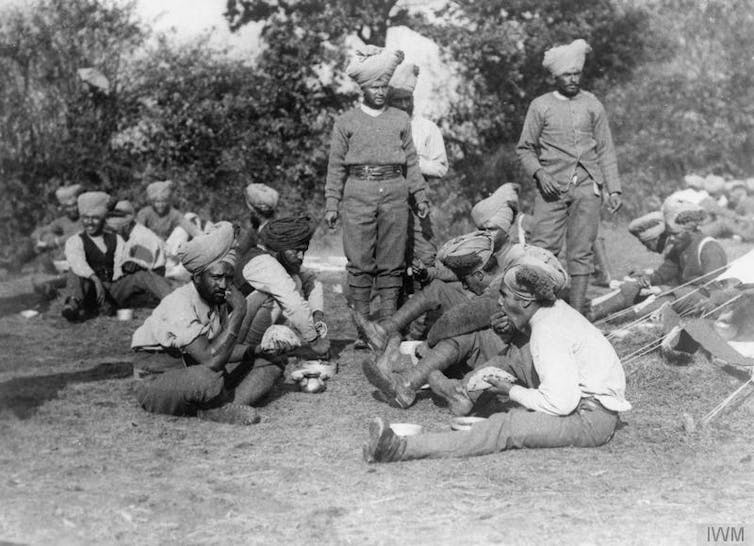Bully Beef in the Army Youtube
Sing me to sleep, the bullets autumn
Allow me forget the war & all
Clammy is my dugout, cold is my feet
Nada but biscuits & slap-up to eat.Popular soldier'due south song, circa 1918, recorded in the diary of Archie A. Barwick.

Many of u.s. will exist making Anzac biscuits this Anzac Solar day, paying homage to an counterfeit story of soldiers in the first world war and the comfort afforded by these gifts sent from home. While the provenance of this most iconic of war food is debatable, nosotros tin learn a lot about what soldiers really ate by reading their letters and diaries. These sources reveal that food was a vital role of daily life, with emotional, cultural and practical facets.
Bang-up beef (brined and boiled beef in a tin) and biscuits were the notoriously boring cornerstones of rations for both Australian and British soldiers in the first world war.
While the rations commonly included other items such equally tea, jam, sugar, bacon, peas, beans or cheese, "B.B.B." were symbolic of the inadequacy of the soldier's diet.
Am living quite a terrible life! No rations or. than B.B.B. How cheerful.
Leonard V. Bartlett, Alexandria, December 1915.
The shortcomings of the rations weren't just a lack of vitamin C and other essential nutrients. Lack of variety and taste in food took an emotional toll on the servicemen, and in the soldiers' letters and diaries we tin see a veritable obsession with food.

The diary of Lieut. Bartlett, a signaller who served in Egypt and Gallipoli, pithily conveys how his emotions fluctuated depending on the food available. Thus on 9 July, 1915 he rejoices:
Salmon for Brekker, what joy, my luck is really in today.
Nine days later on, while suffering from one of his regular bouts of dysentery, he declares:
Feelg. rotten all 24-hour interval & existed on dried biscuits & tea.
For Bartlett and others serving in the Middle E, the harsh conditions fabricated mealtimes a trial; he declared the rations "putrid". One history describes mealtimes in the Hashemite kingdom of jordan Valley in May 1918 as unbearably hot, boiling and plagued by "venomous creatures" of various kinds, these miseries exacerbated by the food:
Rations reached the lines […] in a condition which would have revolted whatever men but soldiers on active service. The staff of life was dry and unpalatable as chaff; the beef, heated and reheated in its tins, came out like and then much cord and oil.

Supplements to the regular army ration were therefore intensely welcome. I letter to Mrs Hugh Venables Vernon thanking her for her contribution to the Australian Comforts Funds describes the soldiers in receipt of her gifts as "similar kiddies at a picnic".
Comfort packages – while probably non containing actual Anzac biscuits – did distribute items redolent of home and civilian life. The "Christmas billies" for the Australian Light Equus caballus in Sinai and Palestine in 1916 included "Christmas puddings, tins of milk, packets of chocolates and similar dainties".
Soldiers also took advantage of opportunities to scrounge, purchase or commandeer supplementary foodstuffs from local populations, including "eggs and camel whey" from a Bedouin encampment in Palestine.
Its'due south worth noting that conditions behind the lines in France were very different to the Centre East. Sapper Vasco, a extravaganza artist and draftsman, wrote messages to his wife from "Somewhere in France" as though on a thou tour, and nutrient featured prominently in his rhapsodic prose:
Precious I […] Ever since I landed in French republic life has been perfect. […] This is our land. If I've ever fabricated upwardly my mind about anything it's to become yous over here 'Apres la guerre'. […] More violent contrasts, more delicious food, wine, exquisite land, music, more café life and true 'bohemianism' on a Dominicus or whatsoever calendar week twenty-four hour period than England e'er dreamt of in a lifetime. […] Sunshine equally mellow every bit Brisbane'due south shines twenty-four hour period after day on La Belle France. […] The pastry cook shops make our pastry cakes taste similar piffle. You lot couldn't believe there was a war on here.
During the war giving or exchanging food – often across cultural divides – was a potent act of caring, and relationships betwixt soldiers were cemented over food. Bartlett writes of having "a pleasant little feed" with his friend Monty, and of a visit from a fellow soldier chosen Merrivale, who shared cake with him.
Bartlett was involved in a lively network of exchange and castling among soldiers, and regularly visited the "Indian Camp" for "chapadies" or back-scratch. Meanwhile in Cairo, Full general Rosenthal enjoyed "a sumptuous dinner of near 15 courses, all exquisitely cooked. The table was set out in faultless British way, just the foods were prepared in Egyptian style."

Even across enemy lines, intercultural culinary encounters occurred, such as during the famous 1914 "Christmas truce" when German and British soldiers entered into no-homo'due south state to substitution gifts of rations, cigarettes and chocolate.
Australian prisoners of state of war experienced specially poignant acts of generosity from civilians as they were marched by German soldiers through occupied France. Corporal Claude Corderoy Benson describes French women attempting to smuggle bread, biscuits and sweets to the POWs, often at cracking personal toll:
I felt I would rather take died from starvation than see these women so ill treated, and wished the poor creatures would not try and help the states.
Bensen describes the deprivation of the prisoners, which makes for harrowing reading:
…very oftentimes the German guard would offer us one-half a loaf of staff of life for a sentinel, and I have seen golden watches and rings go for less than a loaf of breadstuff, anything to satisfy our hunger.
In the long and arduous campaigns of WWI, nutrient – and the lack of it – was paramount. Major battles were fought to control supply lines, and hunger was a brutalising and dehumanising tool of state of war. In looking at food and its exchange, we encounter how the conflict produced both the best and the worst of human behaviour.
The soldier'due south diaries and letters quoted in this commodity are publically available through the World State of war One collection of the State Library of NSW.
Source: https://theconversation.com/bread-like-chaff-and-putrid-rations-how-ww1-troops-obsessed-over-food-55312
0 Response to "Bully Beef in the Army Youtube"
Post a Comment